- Home
- Michael Grant
Eve & Adam Page 5
Eve & Adam Read online
Page 5
I do need to know her, at least a little. Not as a girl, of course—although she is definitely, well, that. But that’s not really the point.
You’re so full of it, Solo. Of course that’s part of it. Why not be honest with yourself and admit that’s part of it?
Yes, okay, yes, you need to get to know her in order to decide whether she’s useful. But dude. Solo. Dude: That’s not all of it.
I decide to let it go. Let Eve and her friend have some time. I don’t need to push it right now. Plus I have work to do.
I watch them rolling away.
Damn.
I don’t like them being here. I’ve gotten along so far in life without so-called peers. I have some people I talk to online. Actual humans my own age, really not important.
And yet I almost can’t resist the magnetic pull as they head into the elevator.
The elevator doors slide shut. “Damn,” I say, resisting my desire to punch something.
My phone buzzes with a text. It’s work, of course. It’s not like my twenty closest friends have my number. It’ll be someone needing a doughnut, or a rack of instruments run through the autoclave, or some forgotten thing fetched from a car in the parking lot. In theory it could be one of my online teachers, but that’s unlikely: I keep up with my work. It’s not a strain.
I check my screen. Tattooed Tommy wants a cappuccino and a poppy-seed bagel.
I groan, head to the elevator. I push “7” and I’m whisked to The Meld, the incredible space where the Big Brains hang out. It’s a vast open area—you could park a passenger jet in it—but it’s broken up into pods of moveable workstations. It’s like they took the cubicles from every boring office on earth—one wall, plus a desk and chair and all of that—and rigged them so they could be driven around.
Each workstation has an electric motor and four nylon wheels. They form into groups and they break apart and re-form into different groups. You never know where any of the individual Big Brains might be just by looking, but we have an app that shows current locations. I know, for example, that Tattooed Tommy, the crazy-smart biochemist from Berkeley, is at grid J-7.
In the kitchen, I grab the coffee cart. Caffeine in various forms, organic herbal tea, bagels, muffins, energy bars. This isn’t my job, but I don’t mind covering for the regular dude. There’s no better way to find out what’s going on than by being a peon everyone ignores. If you’re the coffee guy, it’s just assumed that you don’t understand anything you see on the computer screens, holographic displays, and even the occasional old-school chalkboard.
In a place filled with people who think of themselves as Big Brains, a guy dishing out fruit cups is invisible. No one notices when I seem to be checking e-mail on my phone, but I’m actually taking a picture or hitting the “record” voice memo button. I’ve got a pretty good memory, and that helps, too.
I pause and take a swig from my water bottle. Karen, one of the biochem research assistants, grabs a cheese Danish off my cart. “You get a promotion?” she asks.
I shrug, move on, keep my eyes open. It’s hard to steal data here, very hard. But not impossible.
My biggest problem: At Spiker Biopharm, we don’t do cloud.
It’s a security thing. Everyone uploads data to the cloud. That’s where people have their pictures, their tunes, their manuscripts, whatever. But Spiker isn’t “whatever,” so all Spiker data goes strictly to in-house servers.
No CD burners. No USB ports for thumb drives.
Which makes it very complicated for me to steal data. And yet…
There’s a file in the cloud. I’ve encrypted it so heavily the CIA couldn’t break in. People usually use a four- or five-character security code. My code is thirty-two characters long.
I comfort myself with this knowledge as I make my way toward Tommy.
“Bagel and a capp, right?” I ask.
He’s around thirty. Covered in tattoos, everywhere except his hands, neck, and his face. Even his forehead has the word “Pixies”—that’s an alt-rock band—in gothic script.
Tommy thinks of himself as a cool guy. He’s nice to me, in the condescending way that a person who’s always been the smartest guy in the room is nice to someone he sees as inferior.
“Poppy seed?” he asks.
“Poppy seed,” I confirm.
He takes the food, sighs, and shakes his head. “Hey, kid. Have you met the girl?”
I guess what girl he means, but I need to play dumb. “What girl?”
“The kid. The daughter. I don’t know her name.”
“You mean Evening Spiker? Yeah, I met her.”
He looks at me doubtfully. He’s judging whether I can answer his next question. He’s wondering whether even communicating with me is a waste of time.
“What’s the deal with her? She bright? Stupid? What?”
I shrug. Because I’m just a peasant and that’s what dumb teenagers do. “She seems pretty smart, I guess. Why?”
He shakes his head, irritated. The questions are only supposed to go in one direction. But he’s Tattooed Tommy, so he has to maintain his reputation for not being an a-hole. “Boss is tasking her. On something of mine. Amateur hour.” His eyes flicker, he’s said too much, he’s come too close to criticizing Terror Spiker.
I shrug again. “She can’t be doing much. She’s pretty messed up.”
“Yeah, maybe,” Tommy says confidently, “but I’m guessing she’ll recover amazingly well.”
“I hope so,” I say. And I think, yeah, she will recover amazingly. And thanks for confirming you know that, poppy-seed man.
“Anyway, it’s nothing,” Tommy adds. “The software she’s playing with. Just some widget I threw together one night when I was seriously stoned.”
“Terror was showing it to her this morning,” I say. “Project 88 something?”
“Yeah.” Tommy sips his cappuccino. “Yeah, like I say, it’s crap. A brain fart.”
“Another bagel?” I ask.
“Nah.”
“Later, then.” I wheel away.
A brain fart.
Whatever you say, Tommy.
I know a thing or two about Project 88715, and it’s a whole lot more than some educational widget you threw together after a couple bong hits.
It’s more than a glittering strand of DNA on a giant monitor.
More than a toy that Terra’s using to keep Eve occupied.
This much I know already: When Tommy and the Big Brains, in whispered, wry asides, talk about Project 88715, they call it something else.
They call it the “Adam Project.”
– 14 –
“So when do we get to make his unit?” Aislin asks, staring up at the giant monitor.
“His what?”
“Exactly. His ‘what.’ His ‘Whoa, what is that?’ His area.”
“Are you referring to his boy parts?” I am trying to sound indifferent. Indifferent doesn’t really work well with the phrase “boy parts.” But in my embarrassment I can’t come up with a better phrase.
“Did you just actually say ‘boy parts’?” Aislin asks, rolling a chair over.
“You have to do things in order. That’s how the software works,” I explain. “First it has you decide about the simple physical things. This morning I worked on the eyes.”
“You mean his eyes.” Aislin watches me tap away at my keyboard. “You are making a male, right?”
I nod.
“Atta girl.”
Tap, tap, click. I really love this software. It’s like making art, without the gut-wrenching fear of failure. Creation, with a handy-dandy “delete” key.
I tap something called a “Show Me” button. The screen on the wall shows two enormous irises. Just irises. No whites, nothing else.
“Yuck!” Aislin exclaims. “What the hell are those?”
“Irises. I gave him hazel eyes.”
“How come?”
“I don’t know. I’ve never really known anyone with eyes that color.
Maybe that’s why.”
It’s fascinating, the way they’ve designed this software. There are a bunch of genes that deal with the simple matter of eye color. You drop them into a sort of grid. The grid—which in this version has been designed to look like a very long string of beads—has a lot of the “beads” already filled in. That leaves plenty of blank spots for me to pick and choose.
I can increase or decrease the magnification. At life-size they’re invisibly small. Blown up, they’re six feet in diameter. Zoom in all the way and you get into the nano scale, where they don’t have color at all. They’re just bumpy gray cells.
Aislin puts her boots up on the desk and leans back, hands laced behind her head. “This is creeping me out. Do something un-gross.”
I add very white whites to the eyes. “Okay, now the capillaries,” I say, scanning my choice menu.
“Let’s do abs instead.”
“I told you: It won’t let me. Besides, this is the fun part. All the details.”
“Uh-huh.” Aislin is unconvinced.
I choose small capillaries and Aislin nods her approval. “Don’t want him getting bloodshot too easily.”
I stare at my creation. “I’m not sure about the iris color. It’s kind of muddy.”
“What’s your fantasy eye color?”
“I don’t have one,” I say, because I’m pretty sure I don’t.
Aislin scowls.
I change the irises to blue.
“More,” Aislin says.
Tap, tap. They’re an intense, mountain-lake-at-twilight blue.
“Bingo.”
“Next up,” I say, “visual acuity. Should I make him just a little near-sighted?”
“No,” Aislin says firmly. “No glasses. No contacts, even.”
I pause to consider. Everyone should have flaws. Isn’t that what makes us interesting? Isn’t that what keeps us from just being carbon copies of each other?
A slight adjustment in the shape of the eye and the lens, and he’s wearing Coke-bottle lenses the rest of his simulated life.
“Okay, you win.” I opt for perfect vision. I can always change my mind later.
“How old are these eyes, anyway?” Aislin asks.
“Part of the fun of the simulator is that I can choose the age of my person. I can make him a baby. Or I can age him all the way up until he’s as old as one of those sparkly vampires.” I grin. “But that would be creepy.”
Somehow making a baby seems way too close to reality. Who wants a baby? Later, okay, in ten years, or twenty. Or thirty. Not now. The safe answer—at least this is what I tell myself—is to make him about my age.
“Um, I don’t know how old he should be. Maybe seventeen?”
“Eighteen,” Aislin says firmly.
“Eighteen, then.”
Tap, tap. The color of the irises comes into sharper focus. The whites are just a little less translucent.
The system prompts me: Blood supply needed to achieve viability.
Yes, of course blood supply, but does it have to be right this minute?
“The computer’s blinking at you,” Aislin says, pointing at the screen.
“The eyes need blood.”
“Ick.”
“I can do a whole heart and circulatory system,” I say, reading my options. “Or I can attach a temporary artificial blood supply.”
“Do the second one.” Aislin cocks her head at the giant monitor. “It’s easier.”
The picture on the wall shifts. It’s hard to spot at first. But even the best special effects have a slight air of unreality about them. The images I’ve been seeing are amazing, but now merely amazing is becoming spectacular.
I could swear those two eyes, white balloons trailing unconnected nerve endings, I could swear they’re real. They look exactly as if they’re suspended in clear liquid. The veins and arteries going to and from the eye are attached to a plastic tube that pulsates gently at the rhythm of a human heart.
“Disgusting,” Aislin pronounces.
“But cool,” I say.
Aislin’s phone beeps and she checks the message. “Maddox,” she says, in a tone that’s both elated and apologetic. It’s the special voice she reserves for dumping me. “Sorry, I gotta go.”
“No!” I cry, grabbing her arm with my good hand. “You just got here!”
“He’s freaked about something or other.” Aislin stands and stretches. “You know how he gets.”
Yes. I do know. And I really can’t stand the guy sometimes. But I know enough not to say what I’m thinking.
“Look, it’s the weekend. I can come by tomorrow and play.”
“Okay,” I pout. “But if I get to the good stuff on my guy, I’m doing it without you.” I sigh. I don’t want to be lonely again. “You want the limo to drive you back to town?”
“Nah. Maddox is picking me up. I’m good.” Aislin leans down and hugs me. “I love you, you know.”
“Me, too.”
“Want a push back to your room?”
I gaze at the huge blue eyes hovering before me like twin earths. “I think I’ll stay awhile. I’m kind of getting into this.”
Aislin pauses at the door. “Know what?”
“What?”
“I’m really glad you’re okay.” She waves at the floating eyes. “Bye, Mr. Eyeballs.”
Aislin’s almost out the door when she pauses. “He needs a name, E.V.” She purses her lips. “Well, duh,” she says, snapping her fingers. “Bye, Adam,” she calls, and then she’s gone.
Adam. I guess if you’re going to create a man, you pretty much have to call him Adam.
I don’t really like the name, though. All my life I’ve insisted that people call me “Evening” or “E.V.,” anything but “Eve.” Eve leads inevitably to Adam and Eve, and that leads to forbidden fruit and the whole nudity thing. When you’re in middle school that entire conversation tends to go off the rails.
I wonder if Adam here, Mr. Eyeballs, would object to being called Adam on those same grounds. It feels hypocritical of me to acquiesce to “Adam” just because my unimaginative mother came up with “Eve.”
I could call him Ad for short. Or Dam.
Or Steve, for that matter.
“What do you—”
“Ahhh!” I jump about an inch out of my wheelchair. I brace for the wave of pain that should come from such a sudden movement, but my leg does not cry out in protest.
Thank God for the pain meds.
It’s Solo, pushing some kind of cart. How long has he been standing behind me?
“Hey,” I mutter. “Don’t you knock?”
“No door,” he points out accurately.
“Well, give me some sign that you’re sneaking up on me! Clear your throat or something!”
“Ahem,” he says, clearing his throat. He pushes the cart close to me. “Eyes, huh?” he asks, looking past me at the disembodied eyeballs.
“Yes.” I want to follow up with something sarcastic, but I draw a blank because I’ve turned to look at him and I notice now, how could I not notice, that the eyes I’ve created from scratch are Solo’s eyes.
“What’s that color called?” he asks.
“Just… I… I’m changing it. I was trying for blue.”
“You like blue eyes, huh?”
“Yes. I do. I like blue eyes.”
“I thought you might want something to eat.” He takes a paper sack off the cart.
“Kind of late for lunch, isn’t it?” The clock in the corner of the display reads 03:17 P.M. “How do you know I didn’t already eat lunch?” I ask, just as my stomach growls loudly.
“Intuition,” he says with a straight face.
I save my work on Adam and log out.
“Come on, we don’t want to eat in here,” Solo says. Without waiting for my approval, he plops the bag of food on my lap and takes the grips of my wheelchair.
“What about your cart?”
He shrugs. “What about it?”
W
e go down a level, through a hallway, across yet another open space full of grown-up toys for the Big Brains, and out onto a vast deck overlooking the bay. It’s not the million-dollar view you might get in Tiburon, which faces the city, but it’s not bad. The fog has lifted, and we have a good view of the Richmond–San Rafael Bridge. There’s a tanker riding low, slowly cutting through the water like a migrating whale. If I could somehow look around the corner past Angel Island, I’d be able to see the city. And it bugs me that I can’t. I miss my home, my school, my city.
There’s a group of four, kind of glum, munching at a table twenty yards away, too far for us to overhear them. We spread the food out on a picnic table. Sandwiches, chips, two puddings, one chocolate, one vanilla.
“From the cafeteria?” I ask, pulling one of the sandwiches apart to find turkey and Brie.
“They’re good,” Solo says. “Say one thing for your mom: She takes care of her employees.”
“Yes, I noticed. You know what they don’t have? Double-double, animal style.”
He nods. “You’re an In-N-Out fan?”
“Mostly I want it because I can’t get it,” I admit. “I also want some Coldstone. And I’m having a weird craving for the awful Beef-a-roni they serve on alternate Thursdays at my school. Also… Never mind.”
“No, go on. I find it interesting. Knowing what you miss about normal life.”
I take a bite of sandwich and wash it down with a swig of sparkling water with lime.
“Okay. I miss Zachary’s. Best pizza in SF. I miss having to get ready for school, waiting at the bus stop—”
“You don’t have a limo?”
I make a face. “She’s offered. My mother, I mean.”
“But you don’t want to show up at school in a limo.”
“It kind of marks you as a douche.”
“Yep.”
“There are kids at my school who get dropped off in limos.”
“Private school?”
I laugh. “I tried once to get her to send me to a public school. I thought I’d like to meet some kids who don’t have maids but whose moms are maids.”
“Poor little rich girl,” Solo says.
Maybe I should take offense. But the cool breeze kind of drains the nasty from me. “I miss regular life. Or my version of it, anyway. School.”

 Fear
Fear Plague
Plague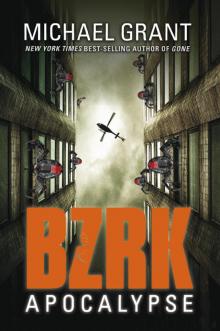 BZRK: Apocalypse
BZRK: Apocalypse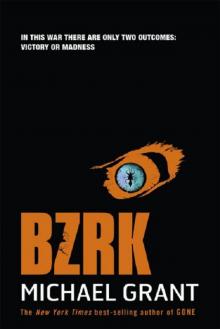 Bzrk
Bzrk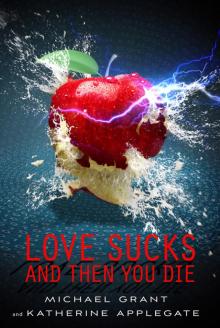 Love Sucks and Then You Die
Love Sucks and Then You Die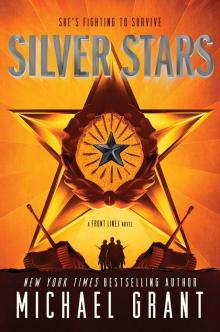 Silver Stars
Silver Stars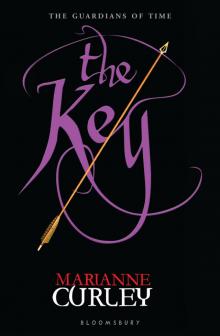 The Key
The Key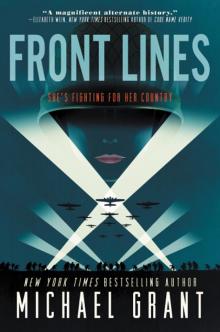 Front Lines
Front Lines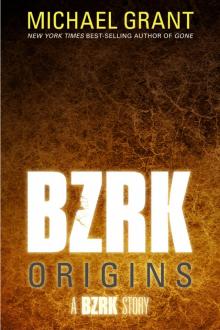 BZRK Origins
BZRK Origins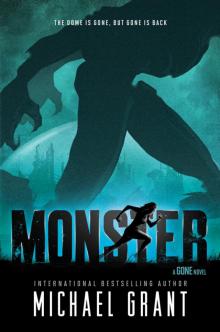 Monster
Monster Gone
Gone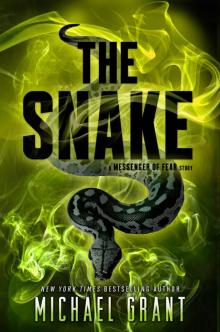 The Snake
The Snake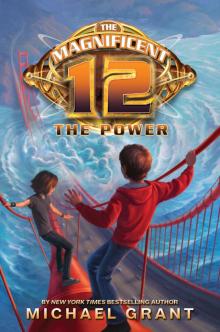 The Power
The Power Hunger
Hunger Lies
Lies A Sudden Death in Cyprus
A Sudden Death in Cyprus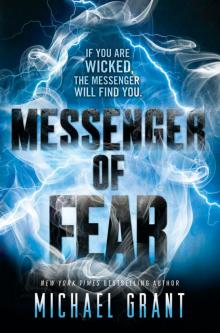 Messenger of Fear
Messenger of Fear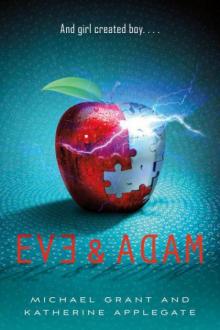 Eve & Adam
Eve & Adam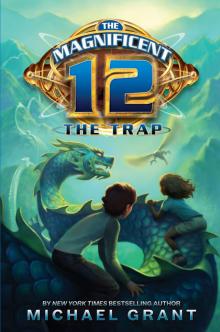 The Trap
The Trap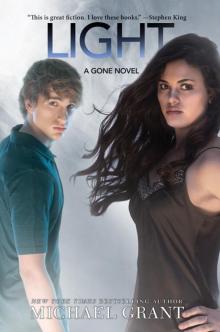 Light
Light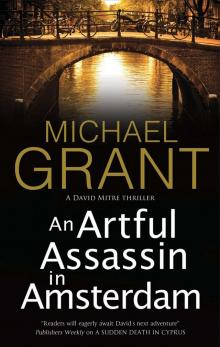 An Artful Assassin in Amsterdam
An Artful Assassin in Amsterdam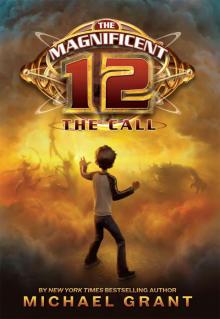 The Call
The Call Hero
Hero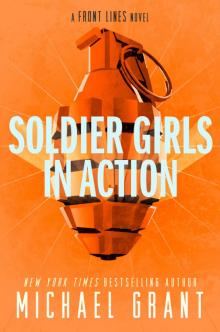 Soldier Girls in Action
Soldier Girls in Action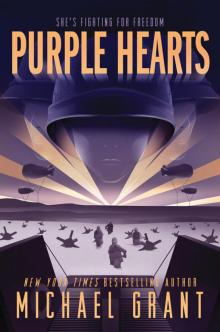 Purple Hearts
Purple Hearts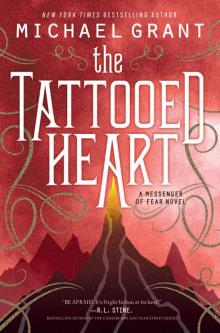 The Tattooed Heart
The Tattooed Heart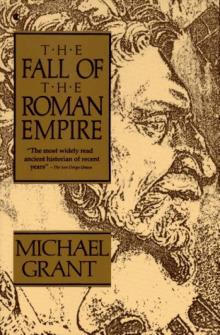 The Fall of the Roman Empire
The Fall of the Roman Empire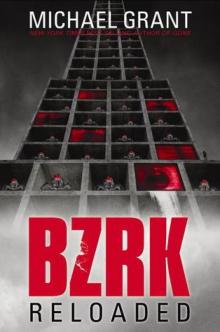 BZRK Reloaded
BZRK Reloaded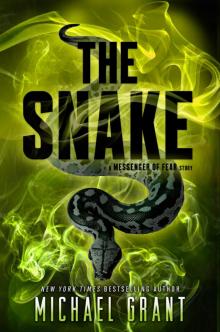 Messenger of Fear Novella #1
Messenger of Fear Novella #1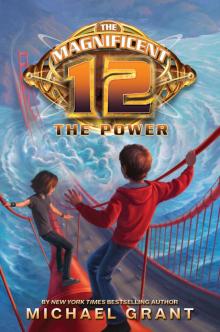 The Magnificent 12
The Magnificent 12 Fear: A Gone Novel
Fear: A Gone Novel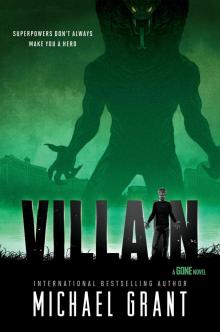 Villain
Villain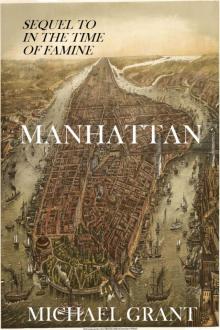 Manhattan
Manhattan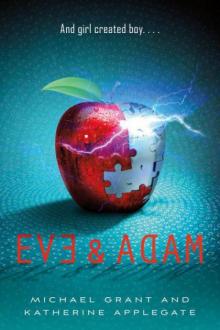 Eve and Adam
Eve and Adam Plague: A Gone Novel
Plague: A Gone Novel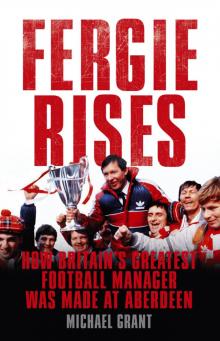 Fergie Rises
Fergie Rises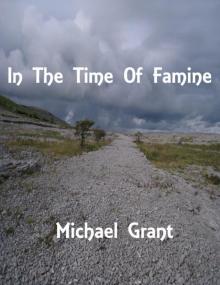 In the Time of Famine
In the Time of Famine Hunger_A Gone Novel
Hunger_A Gone Novel Lies g-3
Lies g-3